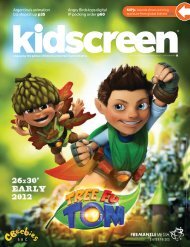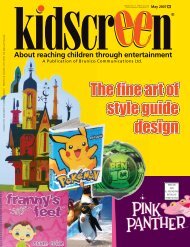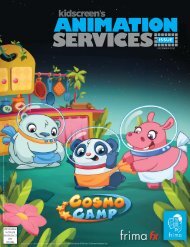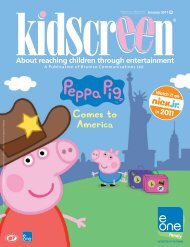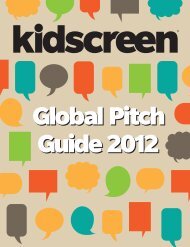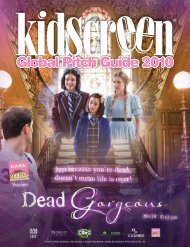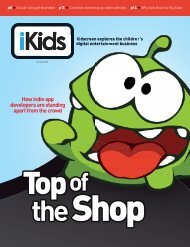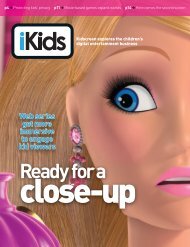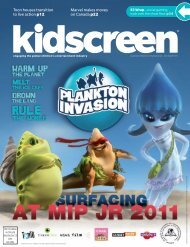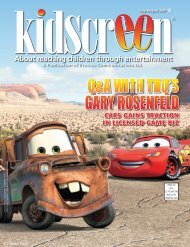download a PDF version - Kidscreen
download a PDF version - Kidscreen
download a PDF version - Kidscreen
You also want an ePaper? Increase the reach of your titles
YUMPU automatically turns print PDFs into web optimized ePapers that Google loves.
Minecraft builds success<br />
one pixel at a time<br />
Open-source indie game Minecraft is no longer an underground<br />
phenomenon. With reported revenues<br />
of US$137.7 million in 2012, and the announcement<br />
earlier this year that 20 million copies of the game<br />
have been sold across all platforms, the curtain has finally risen<br />
on creator and owner Mojang, a 31-person Stockholm-based<br />
game studio.<br />
The game itself, first released in 2009 on PC platforms, brings<br />
players into a deep, immersive 3D digital environment where<br />
they can participate in an almost limitless number of activities,<br />
including combat, building, exploration and even crafting. Minecraft’s<br />
challenging, customizable and constantly updated digital<br />
landscape has spawned a hardcore and dedicated global fanbase,<br />
particularly among kids ages eight to 12.<br />
In 2010, Mojang took its first careful step into the world of<br />
licensing through a deal with Lego to create playsets inspired by<br />
Minecraft. “Lego was obviously our top choice,” says Carl Manneh,<br />
CEO of Mojang. “The original idea actually came from our Minecraft<br />
online community and we approached [Lego] about it.”<br />
The days of Mojang approaching potential licensees, of<br />
course, are gone. The company’s extremely careful approach to<br />
licensing, coupled with fan demand for product, has put it in the<br />
enviable position of sitting back and watching the offers roll in.<br />
“We look at licensing as a way to strengthen the overall<br />
brand,” says Manneh. “One thing we are afraid of is selling out.<br />
We don’t want to overexpose<br />
our brand.”<br />
Accordingly, Minecraft‘s<br />
roster of licensees is small,<br />
but growing. Recently, Mojang<br />
inked a major deal with<br />
Sunrise, Florida-based toyco Jazwares<br />
to produce action figures, electronic<br />
accessories and papercrafts that will hit<br />
US retailers this holiday season.<br />
“We are essentially trying to build upon the pillars of<br />
the gameplay,” says Bill Graham, VP of marketing and product<br />
innovation at Jazwares. “Construction and customization of<br />
the environment are key play patterns.”<br />
Graham says that he expects the lines to hit both specialty<br />
and mass retail later this year.“It’s a global phenomenon,” he<br />
says. “It certainly is on retail’s radar at this point.”<br />
With a publishing deal with UK-based Egmont to produce<br />
four handbooks, a Minecraft magazine and two more books just<br />
announced, Mojang seems to be easing its way into a more robust<br />
program. However, Manneh insists that the company does<br />
not yet need any third-party help from licensing agents.<br />
“We may come to a point when licensing is consuming us,”<br />
he admits. “If we find ourselves working with only licensing, then I<br />
guess we would look to an outside agency to help us.” –Gary Rusak<br />
Minecraft<br />
owner Mojang<br />
approached Lego for<br />
the game’s first license,<br />
but with 20 million game<br />
<strong>download</strong>s and a growing,<br />
rabid fanbase, licensees<br />
are now in hot pursuit<br />
New UK<br />
firm Box of<br />
Awesome<br />
plans to deliver<br />
excitement<br />
to kids, viral<br />
marketing<br />
opps to<br />
licensors<br />
Packaged goodness<br />
There is just something about getting a package in the<br />
mail. And that notion informed the development of<br />
Box of Awesome, an innovative marketing-driven discovery<br />
platform founded by UK entrepreneur Dylan<br />
Collins that launched in February.<br />
“The idea came to me because I was trying to solve the<br />
discovery problem for brands in the kids area,” says Collins.<br />
“There is more content every day and yet there is actually<br />
less physical retail space. We found that both large<br />
and small brands were having trouble communicating to<br />
teens and tweens.”<br />
The solution lies inside an 8.5-inch x 8.5-inch x 3.5-<br />
inch cardboard box that Collins’s company stuffs with goods<br />
from the likes of Topps, Random House, Panini, Nickelodeon<br />
and Mind Candy, among others. Filled with new products<br />
and samples, the boxes are then shipped out to a list of kid<br />
subscribers in the eight to 14 demo.<br />
“The brands understand that this is true word-of-mouth<br />
marketing and that kids don’t receive something physical in<br />
the mail very often,” he says. “It truly stands out.”<br />
Collins’s team curates the box’s content with an eye towards<br />
showcasing new, innovative and creative products<br />
from well-known and undiscovered brands. “Our benchmark<br />
for products is that they be awesome,” he says, adding that<br />
the company’s mandate is to include one book in each box.<br />
“The boxes are substantial in terms of weight and value.”<br />
Box of Awesome’s brand partners pay a placement<br />
fee for being included in the packages and also receive<br />
research reports based on the back-end information the<br />
company collects.<br />
Parents can pay a nominal subscription fee (US$4.50<br />
for two months) to guarantee that their child receives boxes<br />
that are sent out roughly six times a year. Kids can also<br />
sign up on the website (www.boxofawesome.tv) for free<br />
and take their chances that they will be mailed one before<br />
supplies run out.<br />
Box of Awesome also encourages kids to make and post<br />
videos on the site of them opening their box, capturing their<br />
often excited and hilarious reactions to its contents.<br />
To enhance its digital footprint, Box of Awesome purchased<br />
kids digital trading network Swapit (Swapit.co.uk)<br />
in May. Accordingly, the new company is being dubbed SuperAwesome<br />
and will work to merge the digital and physical<br />
marketing platforms. –Gary Rusak<br />
38 May/June 2013



